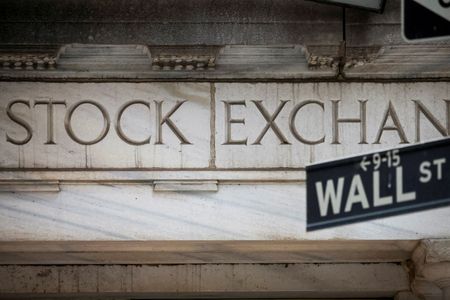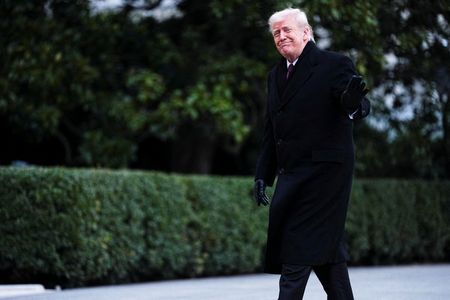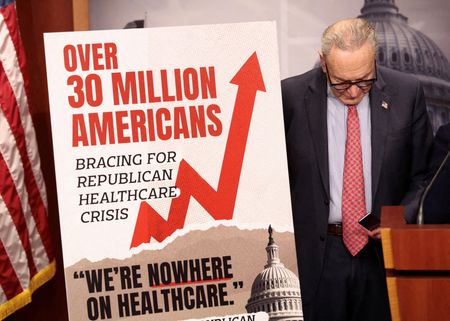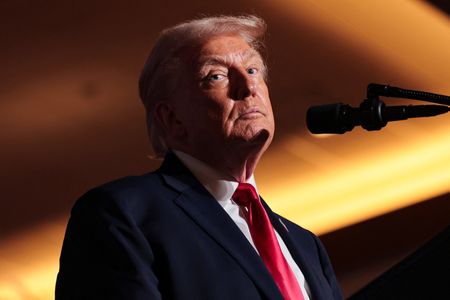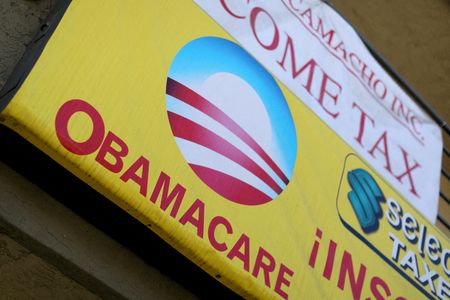By Medha Singh
(Reuters) – U.S. company executives are talking much more about the upcoming presidential election than they did four years ago as a wider policy rift between candidates Kamala Harris and Donald Trump raises questions around taxes, tariffs and pricing power.
In company earnings calls over the two months ended Aug.
15, mentions of “election” or “White House” were 34% higher than the corresponding period in 2020, according to an LSEG Workspace screen of S&P 500 companies.
After energy and carbon emissions, including renewables and electric vehicles, the Inflation Reduction Act (IRA), tariffs and trade were the most talked about policy topics by companies which cited “elections” during second-quarter earnings, according to a separate analysis by FactSet.
Sharper policy differences between the two candidates now than during the 2020 race may be spurring the heightened discussion of the election on earnings calls, said Sam Stovall, chief investment strategist at CFRA Research.
“Company profits could be affected materially, depending on which party gains the White House, and especially if it is either a blue or red wave,” Stovall said.
Harris’ surprise rise to the top of the Democratic ticket following President Joe Biden’s exit from the race in late July has added another layer of uncertainty, investors said.
“We have an idea as to what Trump is planning, but we have less clarity on Harris’ plan.
We have a belief that it’s going to be somewhat continuation of the Biden administration, but a little different,” said Robert Pavlik, senior portfolio manager at Dakota Wealth Management.
Republican nominee Trump has been loud about his intention to go big with trade restrictions, vowing to impose tariffs of 60% or higher on all Chinese goods.
He has also floated the idea of a 10% universal tariff.
Tariffs and taxes are most relevant to U.S. equity fundamentals, Citi Research said in a note, and higher corporate taxes pose a bigger risk to earnings than tariffs do.
“It all comes down to taxes… that’s the rally killer for this market,” said David Wagner, portfolio manager at Aptus Capital Advisors.
“The new corporate tax rate is an instant haircut to earnings growth.
That’s why a lot of these companies are really starting to talk about this to get ahead of the curve.”
Harris is proposing to increase the corporate tax rate to 28% from 21% if she wins the November election.
Trump, who slashed the rate to 21% from 35% during his term and implemented other tax breaks set to expire next year, has pledged to make the cuts permanent.
The closeness of the presidential race – an Ipsos poll conducted Aug. 2-7 showed Harris leading Trump 42% to 37% – makes it difficult for companies to start positioning for a particular outcome.
On companies or people stocking up in advance of potential tariffs, U.S.
chemicals maker Dow Inc’s CEO James Fitterling said, “I don’t think anything has started yet… primarily because there’s all the uncertainty around the election and what policies are going to actually stick.”
Still, some firms have laid out some plans on how they will respond to the election outcome.
Cosmetics company Elf Beauty’s CEO Tarang Amin said the firm would raise prices as it passes on the cost from higher tariffs, should Trump win.
“We don’t like 60% tariff just because we feel it is a tax on American consumers,” Amin said.
Sharpie pen maker Newell Brands is moving some production of kitchen appliances out of China amid tariff uncertainty, CEO Chris Peterson told Reuters.
The election’s outcome may have big implications for companies in the energy and electric vehicle sectors.
On energy, Harris is largely expected to adhere to Biden’s policies and supported his landmark IRA, while Trump is expected to undo much of it.
Trump has also said he would consider ending a $7,500 tax credit for electric-vehicle purchases.
Their ability to push through policies will also depend on securing the backing of Congress.
“The key will be who controls the House and the Senate, irrespective of who is the president,” said Thomas Hayes, chairman and managing member at Great Hill Capital, LLC.
(Reporting by Medha Singh in Bengaluru; Writing by Arpan Varghese; Editing by David Gaffen, Saqib Iqbal Ahmed and Devika Syamnath)

